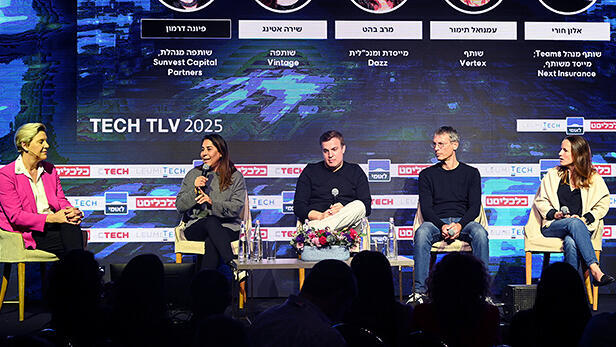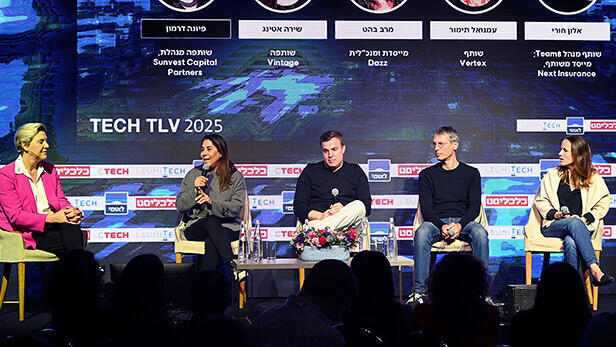
Tech TLV
"Wiz is the world's fastest-growing cyber company and together we can build the largest security company to come out of Israel"
Dazz CEO Merav Bahat was speaking on a panel at Tech TLV two months after being acquired by Wiz for $450 million. The panel also included Alon Huri, Managing Partner at Team8, Fiona Darmon of Sunvest Capital, Emanuel Timor of Vertex Ventures, and Shira Eting from Vintage.
"2025 is going to be Israel's year, and there's a good chance it will surpass 2024. I'm an optimist by nature, but what we've seen here in the past year reflects the strength of Israeli high-tech," said Fiona Darmon, managing partner at Sunvest Capital Partners, at the Tech TLV conference organized by Calcalist and Bank Leumi.
Darmon made the remarks on a panel she moderated at the conference. In addition to her, the panel also included Shira Eting, a partner at Vintage Investment Partners, who is also a combat helicopter pilot and one of the most prominent voices against the judicial reform; Merav Bahat, founder and CEO of cyber startup Dazz, which was acquired by Wiz less than two months ago for $450 million; Emanuel Timor, a partner at Vertex Ventures; and Alon Huri, co-founder of unicorn Next Insurance and currently managing partner at Team8.
1 View gallery


From left: Fiona Darmon, Merav Bahat, Alon Huri, Emanuel Timor, Shira Eting (Photo: Kobi Koenaks)
Shira Eting, tell us what the trends will be in the coming year.
"2024 was a year of continued stabilization that began in 2023. Interest rates stabilized, and following that, the amount of money coming in also leveled out. When you look at the market, you have to divide it into two worlds—AI (and in Israel, cyber too) and non-AI. When you look at AI, you see a bubble—a lot of money invested at very high valuations. On the other hand, in companies that are not involved in AI, it is very difficult to raise money, and they often do so at lower valuations."
According to Eting, "If you ask what the effects of the judicial reform or the war are, these aren’t currently reflected in the data. Another interesting trend we see is that it’s not enough to just be good—you have to be excellent. There is money waiting to be invested in funds and companies, but only in those that are more certain to generate returns. If you are just good but not excellent or well-known, it will be difficult for you to raise money. Regarding IPOs in 2025, you have to be careful with predictions, but IPOs will likely continue to develop."
Merav Bahat, tell us about your journey at Dazz. How did you end up selling to Wiz?
"We are in a very exciting time, a little over a month after the sale. I'll start by saying that even though cyber is talked about as the hottest thing with so many investments, it’s still very, very difficult to make it a success. To really succeed, it’s not just important to be in cyber, but to build the right thing, and there’s a lot of competition."
According to Bahat, "It's not enough to be good—you have to be excellent and run fast. Every minute you blink, someone passes you. Along the way, what’s most important when starting a company is choosing the right partners. People waste time on the idea, but what matters most is choosing the partners and listening to the customers. You must not fall in love with the idea, and do everything for the customers. If they're happy, you're on the right track."
Bahat commented on the acquisition by Wiz: "We had just raised money and started doing strategic collaborations, and then Wiz CEO Assaf Rappaport called to see if anything was happening."
Bahat emphasized that "building a company to sell it is a mistake. We wanted to build a solution that was innovative and met a real need. We recruited a great sales team. We saw how we were gaining momentum, all these things happened, and then we were sold. It was probably the right time. Because we and Wiz are in the world of cloud security, mutual customers told us that the connection made sense. Wiz is the fastest-growing company in the world of cybersecurity, and together we can build the largest security company to come out of Israel."
Alon Huri, you are here wearing two hats, both as one of the founders of Next Insurance and as a partner in Team8. Can you tell us why you moved to Team8 and what you want to do there?
"What excites every entrepreneur, and especially me, is thinking about the idea. I call it the glory of creation, and Team8, for me, is the place. At Next Insurance, we built a company—it’s a long journey. I was previously part of a company that made a pretty good exit (a company named Check that was sold to Intuit for $360 million), and as entrepreneurs, we felt that we could have done much more. That was the drive to establish Next Insurance. We wanted to build something big from the ground up, and it’s amazing that today Next has reached this place. Personally, I discovered Team8—and like a kid in a candy store—it’s the playground where I can play and build friendships with the best and most amazing entrepreneurs."
According to Huri, Team8 recently started developing groundbreaking technology: "This technology is going to help entrepreneurs with the hardest problem—finding the problem. Everyone says, 'I have the idea for a startup,' but I think the real challenge is finding a big, painful problem. We are developing AI technology to identify such problems and a tool that will know how to investigate them. This is the thing I want most in the world."
Emanuel Timor, tell us a little about how you seek investments at Vertex.
"Vertex is one of the oldest funds in the country. We support companies from the idea stage to the exit, and this is what we enjoy the most. It's unpleasant to say this in light of the state of the country, but 2024 was a very good year for Israeli high-tech, and an amazing year for Vertex. We made major exits, raised a new fund, and we see good progress in our companies."
According to Timor, "There’s always the question of whether there’s a decline in the number of new ventures in Israel. If we look at the quality, there are some outstanding ventures. It is an amazing time to be an entrepreneur, although it is not easy because you are not alone, but there are tremendous opportunities, and I am very optimistic about Israel."
Tell me briefly how a company can stand out in 2025 to raise money.
Merav Bahat: "To stand out and succeed, you need to build the best team and recruit talent. Build the right team, listen to customers, and don’t be in love with your own idea."
Alon Huri: "I am optimistic by nature about 2025, but even more optimistic about Israel. God willing, there will be a hostage deal, and we will be past the war. After wars, we see growth booms. Israeli high-tech came together, and beyond the fact that we managed to survive, we showed how unique Israeli DNA is—and it’s something appreciated worldwide. We are going to see an upward trend, and I am very optimistic about Israel. I also put my money in Israel."
Emanuel Timor: "In 2024, we saw a very impressive display of confidence in Israel from the largest funds in the US. It’s natural to assume this will only grow stronger, especially if there’s calm here. Regarding ventures, 2025 won’t differ significantly from previous years, except that the amount of money people want to invest in AI is huge. In this sense, we’re seeing a return to 2021, when it was easier to raise money—but this is only true for well-prepared teams with validated ideas."
Shira Eting: "This year was a kind of miracle, but only because significant resources were invested here years ago. Looking ahead, we must ensure a stable democracy, continue investing in education, and expand beyond cyber. Two or three years ago, we woke up and realized that if we don’t all enlist in public and social causes, the country won’t survive. We must commit to serving the country in these areas, just as we serve as reservists in the army."













